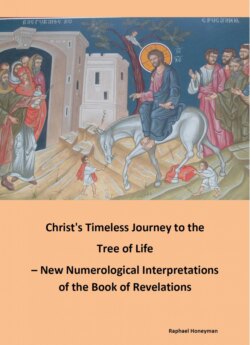Читать книгу Christ's Timeless Journey to the Tree of Life – New Numerological Interpretations of the Book of Revelations - Raphael Honeyman - Страница 4
На сайте Литреса книга снята с продажи.
The Wild Donkeys and the Exodus from Egypt
ОглавлениеThe only non-biblical description of the Exodus of the Israelites from Egypt was made by the Roman historian Tacitus in a report on Judaism. According to this account, donkeys helped the Israelites to survive in the desert by leading them to hidden water sources (Tacitus Histories 5, 3):
“[…]. Others again find a famous ancestry for the Jews in the Solymi who are mentioned with respect in the epics of Homer; this tribe is supposed to have founded Jerusalem and named it after themselves. Most authorities, however, agree on the following account. The whole of Egypt was once plagued by a wasting disease which caused bodily disfigurement. So pharaoh Bocchoris went to the oracle of Hammon to ask for a cure, and was told to purify his kingdom by expelling the victims to other lands, as they lay under a divine curse. Thus a multitude of sufferers was rounded up, herded together, and abandoned in the wilderness. Here the exiles tearfully resigned themselves to their fate. But one of them, who was called Moses , urged his companions not to wait passively for help from God or man, for both had deserted them: they should trust to their own initiative and to whatever guidance first helped them to extricate themselves from their present plight. They agreed, and started off at random into the unknown. But exhaustion set in, chiefly through lack of water, and the level plain was already strewn with the bodies of those who had collapsed and were at their last gasp when a herd of wild asses left their pasture and made for the spade of a wooded crag. Moses followed them and was able to bring to light a number of abundant channels of water whose presence he had deduced from a grassy patch of ground. This relieved their thirst. They traveled on for six days without a break, and on the seventh they expelled the previous inhabitants of Canaan, took over their lands and in them built a holy city and temple“ (Tacitus, Histories 5, 2-3).
Out of gratitude for the help of the donkeys, the Jews worshiped the ass according to Tacitus in their temple: “[…] In the innermost part of the Temple, they consecrated an image of the animal which had delivered them from their wandering and thirst […]“ (Tacitus, Histories 5, 4).
The worshipping of the donkey by the Israelites is apparently (else the account of Tacitus would be inconsistent) not to be equated with an idol worship such as for a Golden Calf, as Tacitus continues to write that: “[…] The Egyptians worship a variety of animals and half-human, half-bestial forms, whereas the Jewish religion is a purely spiritual monotheism. They hold it to be impious to make idols of perishable materials in the likeness of man: for them, the Most High and Eternal cannot be portrayed by human hands and will never pass away. For this reason they erect no images in their cities, still less in their temples.“ (Tacitus, Histories 5, 5).
“You set a boundary to the waters
that they may not cross over,
so they may not return to cover the earth.
You make springs gush into the valleys.
They run between the mountains.
They give drink to all the beasts of the field—
the wild donkeys quench their thirst.“
(Psalms 104, 9-11 ((Tree of Life Bible Version)))
The enigma of the Sphinx of Luxor
